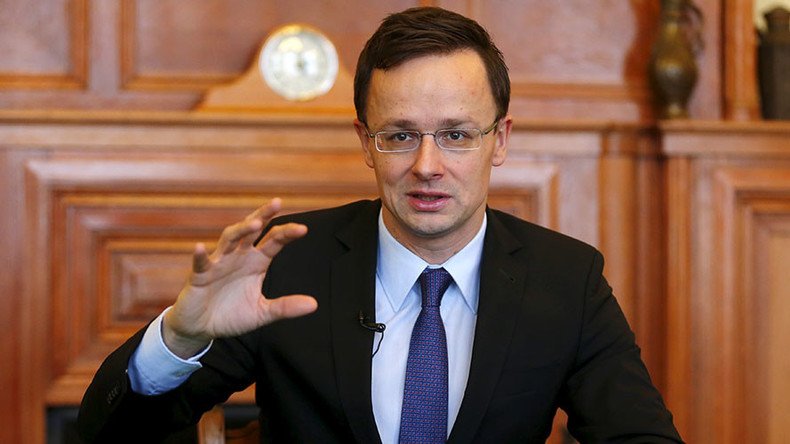Russia poses no threat to NATO members - Hungarian FM

Claims that Russia is preparing to invade one of its NATO-member neighbors run counter to reality, Hungary's foreign minister believes, despite what other states in the bloc think of the issue.
“I don't think it is a realistic assumption today that Russia would attack any NATO member state,” Reuters quoted Hungarian Foreign Minister Peter Szijjarto as saying in an interview with national news portal Index.hu.
“This is not how we feel about Russia. I don't think Russia would pose an existential threat to us,” Szijjarto said, adding that he respects that every alliance member’s individual perception of Russia could vary.
MORE: Russian Ministry of Defense invites NATO for talks https://t.co/A8DHJjWJBnpic.twitter.com/qpxbTs3Knh
— RT (@RT_com) August 1, 2016
The NATO summit held in the Polish capital Warsaw in early July made public the fact that NATO perceives Russia to be a bigger threat than terrorist group Islamic State (IS, formerly ISIS/ISIL).
Although NATO officials offered assurances that the alliance is seeking dialogue with Russia, the deployment of American missile defense systems in Europe and additional forces near Russia’s borders have raised concerns in Moscow that what NATO really wants is escalation.
READ MORE: NATO missile defense goes live in Europe, isolating Russia not the goal – Stoltenberg
In late July, a US-based Atlantic Council think tank document titled ‘Arming for Deterrence’ outlined what NATO in general and Poland in particular should do to “counter a resurgent Russia.” The threat of such an attack is imminent, the report stated.
NATO missile defense goes live in Europe, isolating Russia not the goal – Stoltenberg https://t.co/hzCkN3l7yw#WSEF16
— RT (@RT_com) July 9, 2016
“Even if Moscow currently has no immediate intent to challenge NATO directly, this may unexpectedly change overnight and can be implemented with great speed, following already prepared plans. The capability to do so is, to a large extent, in place,” the report warned.
READ MORE: ‘If NATO encroaches on nuclear Russia, it will be punished’
Apart from buying more weapons, stationing NATO nuclear weapons on its territory and making military cooperation with the US even closer, the report suggested that Warsaw should choose targets for potential cyber offensive operations, “which could include the Moscow metro, the St. Petersburg power network, and Russian state-run media outlets such as RT.”
The document suggested that Poland “is not required to win the war, but it must be able to fight alongside the host-nation forces to buy NATO more time for reinforcement.”
READ MORE: Poland must target Kaliningrad, Moscow Metro & RT to deter Russian invasion – think tank
Hungary, however, has lately been at odds with NATO's stance on Russia. In May, Foreign Minister Szijjarto said Budapest disagrees with the automatic extension of EU sanctions against Moscow, claiming that the decision to prolong them “was made behind the scenes.”
READ MORE: Hungary opposes automatic, ‘behind the scenes’ extension of EU sanctions against Russia
In mid-March, when Italian Foreign Minister Paolo Gentiloni made the point after a meeting with his EU counterparts in Brussels that his country "cannot take for granted any decision [on sanctions] at this stage," Hungary’s FM backed the stance.
“You cannot decide on sanctions by sweeping the issues under the carpet. We believe that the question of sanctions should be decided at the highest level. It cannot be automatic,” Szijjarto said.
Hungary disapproves automatic, 'behind the scenes' extension of EU sanctions against Russia https://t.co/wzJGLc0wDTpic.twitter.com/KRNYFL54Z9
— RT (@RT_com) May 26, 2016
Having visited Moscow in mid-February, Hungarian Prime Minister Viktor Orban criticized the EU’s attempts to isolate Moscow.
“We think that without cooperation with the Russians we cannot achieve our goals,” the Hungarian PM said, referring mainly to energy security.
READ MORE: ‘Strategic rift’: Hungary PM criticizes EU partners trying to isolate Moscow
In 2014, Moscow and Budapest signed a deal for Russia’s Rosatom nuclear company to build two new reactors with a combined capacity of 1,200 megawatts at Hungary’s only nuclear power plant, which currently has four reactors. The deal involves a €10 billion (US$11.2 billion) loan that Moscow offered to Budapest on condition that the money would pay for the equipment for the reactors.












